III Division
Group I
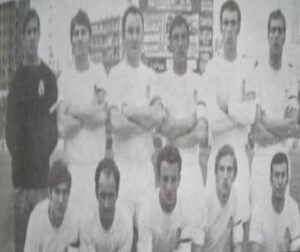
1 Cultural Leonesa 38 28 5 5 90 31 +59 61
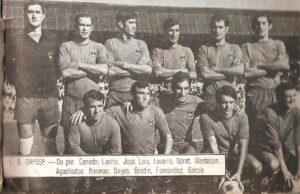 2 Ourense 38 28 4 6 59 20 +39 60
2 Ourense 38 28 4 6 59 20 +39 60
3 Sestao 38 26 4 8 78 32 +46 56
4 Barakaldo 38 23 9 6 59 22 +37 55
5 Bilbao Athletic 38 21 10 7 78 30 +48 52
6 Baskonia 38 16 10 12 60 46 +14 42
7 Real Avilés 38 17 8 13 45 36 +9 42
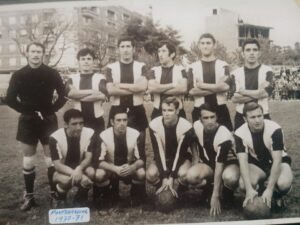 8 Ponferradina 38 16 9 13 63 45 +18 41
8 Ponferradina 38 16 9 13 63 45 +18 41
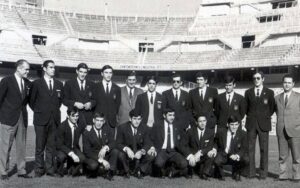 9 Ensidesa 38 13 14 11 59 52 +7 40
9 Ensidesa 38 13 14 11 59 52 +7 40
10 Lugo 38 15 8 15 43 38 +5 38
11 Caudal 38 13 12 13 41 42 −1 38
12 Gimnástica de Torrelavega 38 11 11 16 34 41 −7 33
13 Candás 38 10 12 16 38 51 −13 32
14 San Martín 38 12 6 20 44 72 −28 30
15 Siero 38 9 9 20 45 78 −33 27
16 Lemos 38 8 7 23 40 77 −37 23
17 Barreda 38 6 11 21 34 80 −46 23
18 Toluca 38 9 5 24 32 89 −57 23
19 Vetusta 38 6 9 23 34 66 −32 21
20 La Bañeza 38 6 7 25 32 81 −49 19
Group II
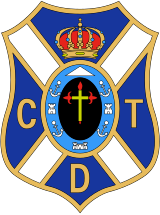
1 Tenerife 38 23 7 8 62 20 +42 53
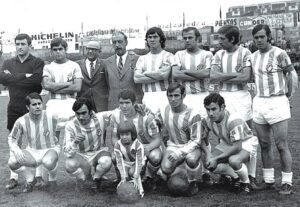 2 Valladolid 38 21 10 7 76 35 +41 52
2 Valladolid 38 21 10 7 76 35 +41 52
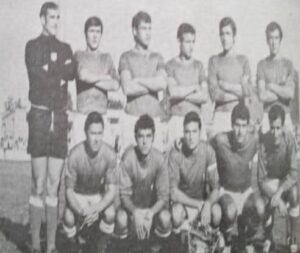 3 Palencia 38 21 8 9 57 37 +20 50
3 Palencia 38 21 8 9 57 37 +20 50
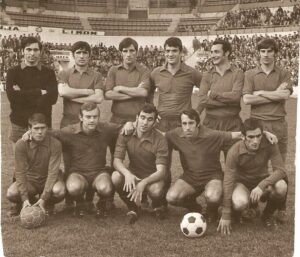 4 Osasuna 38 22 6 10 67 44 +23 50
4 Osasuna 38 22 6 10 67 44 +23 50
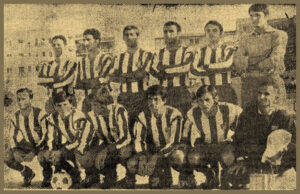 5 Atlético Madrileño 38 19 10 9 70 45 +25 48
5 Atlético Madrileño 38 19 10 9 70 45 +25 48
6 Talavera 38 16 11 11 55 49 +6 43
7 Eibar 38 16 10 12 48 40 +8 42
8 San Sebastián 38 15 10 13 56 49 +7 40
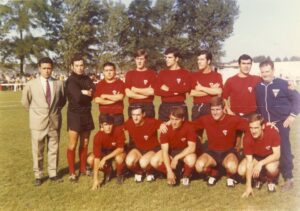 Standing from left: Esparza (entrenador), Aramayo, Eguaras, Lopetegui, Arroyabe, Nano, Kaito y Adolfo (masajista)
Standing from left: Esparza (entrenador), Aramayo, Eguaras, Lopetegui, Arroyabe, Nano, Kaito y Adolfo (masajista)
Crocuhing: Piñuela, Mendívil, Pérez Navares, Mena y Euba.
9 Mirandés 38 12 15 11 38 34 +4 39
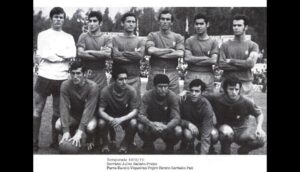 10 Salamanca 38 13 12 13 53 40 +13 38
10 Salamanca 38 13 12 13 53 40 +13 38
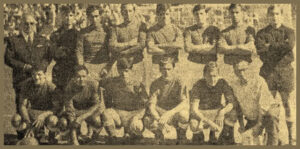 11 Plus Ultra 38 16 6 16 50 58 −8 38
11 Plus Ultra 38 16 6 16 50 58 −8 38
12 Getafe 38 15 7 16 57 50 +7 37
13 Huesca 38 12 11 15 46 51 −5 35
14 Real Unión 38 12 11 15 38 49 −11 35
15 Calvo Sotelo Andorra 38 15 5 18 40 56 −16 35
16 Tudelano 38 12 10 16 33 44 −11 34
17 Chantrea 38 13 7 18 47 70 −23 33
18 Michelín 38 9 7 22 46 67 −21 25
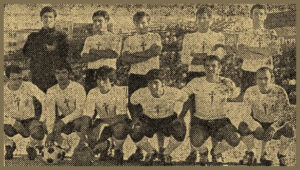 19 Carabanchel 38 8 4 26 32 70 −38 20
19 Carabanchel 38 8 4 26 32 70 −38 20
20 Ejea 38 4 5 29 24 87 −63 13
Group III
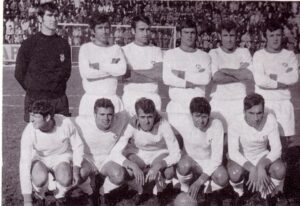
1 Mestalla 38 25 5 8 54 21 +33 55
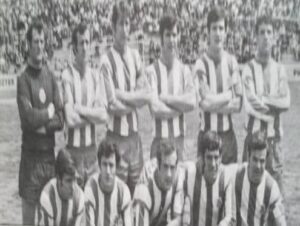 2 Girona 38 21 10 7 53 26 +27 52
2 Girona 38 21 10 7 53 26 +27 52
3 Terrassa 38 21 7 10 67 42 +25 49
4 FC Barcelona Atlético 38 20 9 9 67 37 +30 49
5 Europa 38 19 6 13 62 46 +16 44
6 Alcoyano 38 19 5 14 45 42 +3 43
7 Calella 38 16 10 12 50 44 +6 42
8 Gandía 38 17 7 14 50 43 +7 41
9 Algemesí 38 15 9 14 50 50 0 39
10 Poblense 38 12 13 13 39 53 −14 37
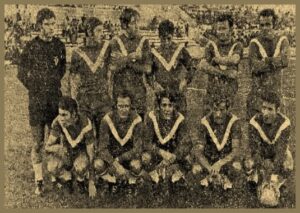 11 Badalona 38 14 8 16 43 45 −2 36
11 Badalona 38 14 8 16 43 45 −2 36
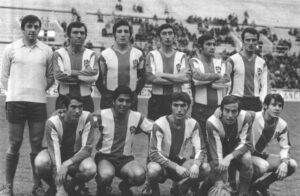 12 Levante 38 13 9 16 58 51 +7 35
12 Levante 38 13 9 16 58 51 +7 35
13 Gimnàstic de Tarragona 38 12 11 15 44 52 −8 35
14 Tortosa 38 15 4 19 43 56 −13 34
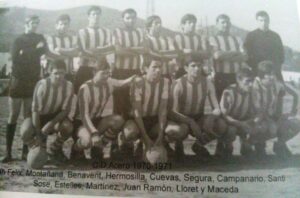 15 Acero 38 13 8 17 53 57 −4 34
15 Acero 38 13 8 17 53 57 −4 34
16 Ibiza 38 14 6 18 42 49 −7 34
17 Atlético Baleares 38 11 9 18 38 48 −10 31
18 Júpiter 38 11 5 22 37 63 −26 27
19 Paiporta 38 7 9 22 38 79 −41 23
20 Mataró 38 5 10 23 27 56 −29 20
Group IV

Standing from left: Cristobal (masajista), Caraballo, Julito, Zarate, Rafita Verdu, Parra, Lara, Ravelo, Bailaro, Vera Palmer, Pelito, Velasco.
Sitting: Serrano, Fali, Viqueiras, Vinuesa, Becerra, Prieto, Valera (entrenador), Del Pozo, Pepín, M. Benítez, Mendoza, Goñi, Rodri
1 Xerez 38 22 11 5 50 24 +26 55
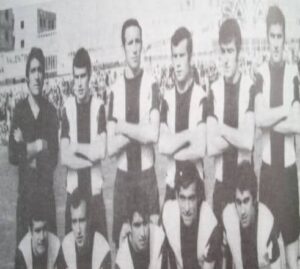 2 Cartagena 38 23 8 7 66 21 +45 54
2 Cartagena 38 23 8 7 66 21 +45 54
3 Recreativo de Huelva 38 21 10 7 58 32 +26 52
4 Portuense 38 17 10 11 41 37 +4 44
5 Sevilla Atlético 38 17 10 11 54 48 +6 44
6 Ceuta 38 19 5 14 55 41 +14 43
7 Triana 38 16 9 13 43 41 +2 41
8 Real Jaén 38 15 10 13 46 34 +12 40
9 Real Murcia 38 15 9 14 47 39 +8 39
10 Valdepeñas 38 14 10 14 48 36 +12 38
11 Melilla 38 12 13 13 43 35 +8 37
12 Badajoz 38 14 9 15 47 49 −2 37
13 Atlético Malagueño 38 12 12 14 40 44 −4 36
14 Español de San Vicente 38 15 5 18 47 46 +1 35
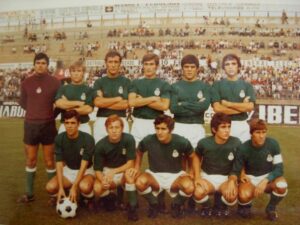 15 Ilicitano 38 13 7 18 37 58 −21 33
15 Ilicitano 38 13 7 18 37 58 −21 33
16 Balompédica Linense 38 13 7 18 31 47 −16 33
17 Mérida Industrial 38 10 11 17 43 54 −11 31
18 Imperial 38 7 12 19 31 50 −19 26
19 Recreativo de Granada 38 8 8 22 33 66 −33 24
20 Llerenense 38 6 6 26 28 85 −57 18
Promotion playoff
Team 1 Agg.
Tooltip Aggregate score Team 2 1st leg 2nd leg
Logroñés3–2 Cartagena 3–0 0–2
Girona 1–4 Villarreal1–2 0–2
Real Oviedo4–1 Palencia 2–0 2–1
Ourense 2–4 Langreo1–1 1–3
1. Spartak Trnava 30 17 6 7 52-27 40
2. VSS Kosice 30 16 4 10 46-30 36
3. Sklo Union Teplice 30 14 7 9 38-26 35
4. Sparta Praha 30 14 7 9 38-32 35
5. Banik Ostrava 30 11 12 7 39-32 34
6. Slovan Bratislava 30 11 10 9 34-28 32 7. Inter Bratislava 30 11 8 11 35-34 30 8. Tatran Presov 30 11 8 11 28-32 30 9. ZVL Zilina 30 9 11 10 39-40 29
10. TZ Trinec 30 12 5 13 32-36 29 11. Jednota Trencin 30 12 5 13 38-44 29
12. Slavia Praha 30 11 7 12 27-33 29
13. Dukla Praha 30 10 8 12 42-41 28 14. Lokomotiva Kosice 30 9 8 13 27-30 26
15. Skoda Plzen 30 8 6 16 30-54 22 16. TJ Gottwaldov 30 5 6 19 30-56 16

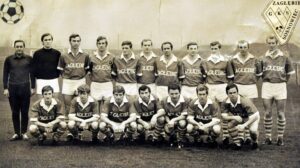 Zaglebie tried hard, but it was still Gornik’s time and playing at the Cup’s final was honorable achievement.
Zaglebie tried hard, but it was still Gornik’s time and playing at the Cup’s final was honorable achievement.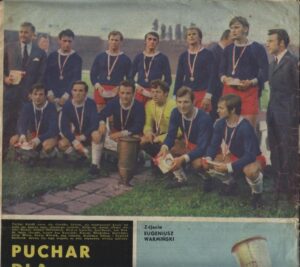
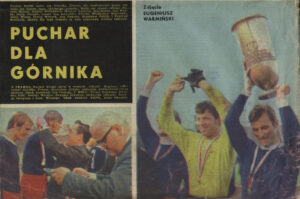
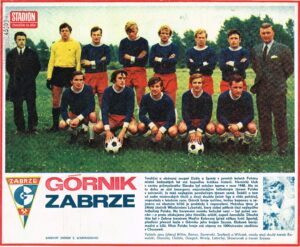
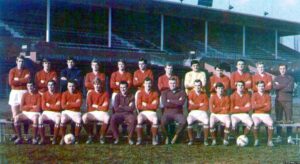

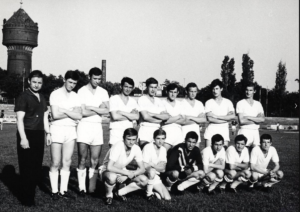 pl pts w d l gf ga
pl pts w d l gf ga 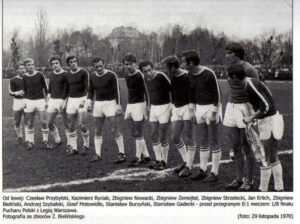 4 MZKS Arka Gdynia 30 33 11 11 8 36 27
4 MZKS Arka Gdynia 30 33 11 11 8 36 27  6 Motor Lublin 30 32 13 6 11 27 23
6 Motor Lublin 30 32 13 6 11 27 23 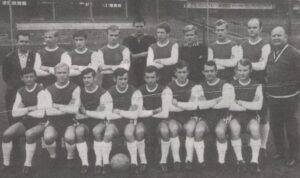 10 Śląsk Wrocław 30 30 11 8 11 30 31
10 Śląsk Wrocław 30 30 11 8 11 30 31 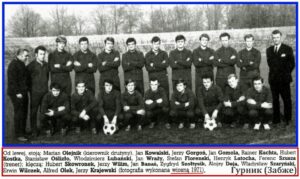 c 1 GÓRNIK ZABRZE 26 39 17 5 4 43 21
c 1 GÓRNIK ZABRZE 26 39 17 5 4 43 21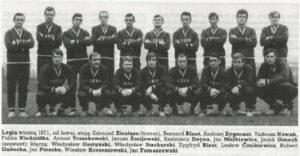 u 2 Legia Warszawa 26 34 14 6 6 39 20
u 2 Legia Warszawa 26 34 14 6 6 39 20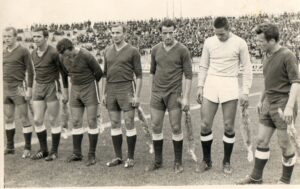
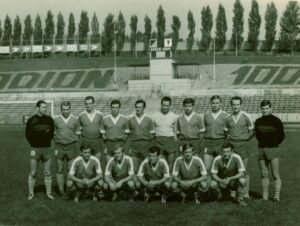 Standing from left:Kobiałko, Stachuła, Nowak, Adamski, Dworniczek, Szeja, Kwiatkowski, Galas, Kasprzyk, Masiel. Crouching: Pawlik, Pietraszewski, Cieszowic, Szłykowicz, Kampa
Standing from left:Kobiałko, Stachuła, Nowak, Adamski, Dworniczek, Szeja, Kwiatkowski, Galas, Kasprzyk, Masiel. Crouching: Pawlik, Pietraszewski, Cieszowic, Szłykowicz, Kampa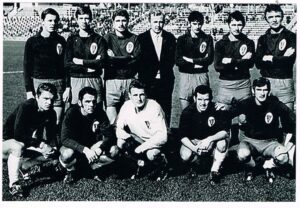
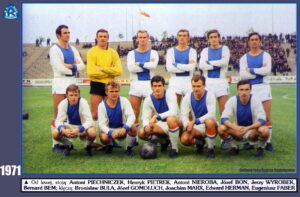 5 Ruch Chorzów 26 25 8 9 9 43 32
5 Ruch Chorzów 26 25 8 9 9 43 32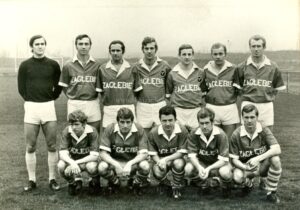 7 Zagłębie Sosnowiec 26 25 8 9 9 32 37
7 Zagłębie Sosnowiec 26 25 8 9 9 32 37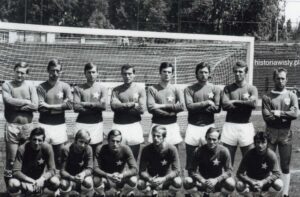 Standing from left: Gonet, Lendzion, Kmiecik, Wójcik, Polak, Płonka, Kotlarczyk, Stroniarz; Front: Musiał, Michaliszyn? Sarnat, Studnicki, Skupinik, Sputo.
Standing from left: Gonet, Lendzion, Kmiecik, Wójcik, Polak, Płonka, Kotlarczyk, Stroniarz; Front: Musiał, Michaliszyn? Sarnat, Studnicki, Skupinik, Sputo.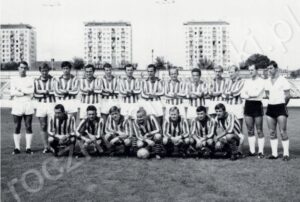 9 Stal Rzeszów 26 24 6 12 8 34 26
9 Stal Rzeszów 26 24 6 12 8 34 26
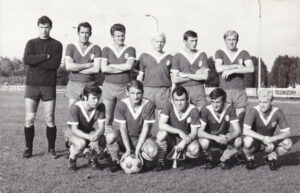 11 Gwardia Warszawa 26 23 8 7 11 24 28
11 Gwardia Warszawa 26 23 8 7 11 24 28 Polonia on the left vs Ruch Chorzow
Polonia on the left vs Ruch Chorzow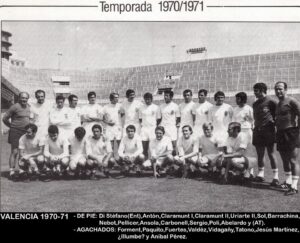 Velencia lost the final for second year in a row and was unable to earn a double.
Velencia lost the final for second year in a row and was unable to earn a double.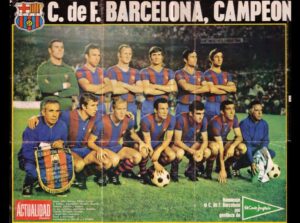
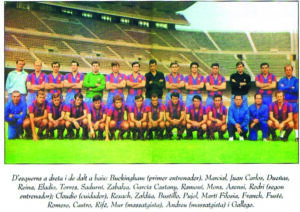 Barcelona won dramatic final and ended the season with a trophy.
Barcelona won dramatic final and ended the season with a trophy.
 2 Ourense 38 28 4 6 59 20 +39 60
2 Ourense 38 28 4 6 59 20 +39 60 8 Ponferradina 38 16 9 13 63 45 +18 41
8 Ponferradina 38 16 9 13 63 45 +18 41 9 Ensidesa 38 13 14 11 59 52 +7 40
9 Ensidesa 38 13 14 11 59 52 +7 40
 2 Valladolid 38 21 10 7 76 35 +41 52
2 Valladolid 38 21 10 7 76 35 +41 52 3 Palencia 38 21 8 9 57 37 +20 50
3 Palencia 38 21 8 9 57 37 +20 50 4 Osasuna 38 22 6 10 67 44 +23 50
4 Osasuna 38 22 6 10 67 44 +23 50 5 Atlético Madrileño 38 19 10 9 70 45 +25 48
5 Atlético Madrileño 38 19 10 9 70 45 +25 48 Standing from left: Esparza (entrenador), Aramayo, Eguaras, Lopetegui, Arroyabe, Nano, Kaito y Adolfo (masajista)
Standing from left: Esparza (entrenador), Aramayo, Eguaras, Lopetegui, Arroyabe, Nano, Kaito y Adolfo (masajista) 10 Salamanca 38 13 12 13 53 40 +13 38
10 Salamanca 38 13 12 13 53 40 +13 38 11 Plus Ultra 38 16 6 16 50 58 −8 38
11 Plus Ultra 38 16 6 16 50 58 −8 38 19 Carabanchel 38 8 4 26 32 70 −38 20
19 Carabanchel 38 8 4 26 32 70 −38 20
 2 Girona 38 21 10 7 53 26 +27 52
2 Girona 38 21 10 7 53 26 +27 52
 12 Levante 38 13 9 16 58 51 +7 35
12 Levante 38 13 9 16 58 51 +7 35 15 Acero 38 13 8 17 53 57 −4 34
15 Acero 38 13 8 17 53 57 −4 34
 2 Cartagena 38 23 8 7 66 21 +45 54
2 Cartagena 38 23 8 7 66 21 +45 54 15 Ilicitano 38 13 7 18 37 58 −21 33
15 Ilicitano 38 13 7 18 37 58 −21 33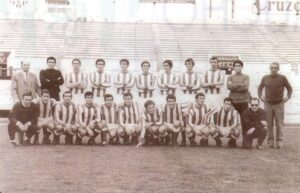
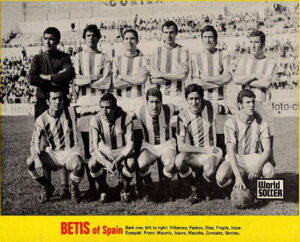
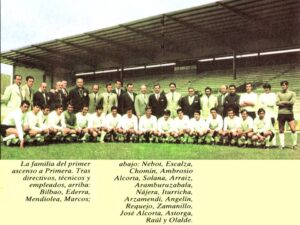 2 Burgos (P) 38 19 7 12 46 30 +16 45[a]
2 Burgos (P) 38 19 7 12 46 30 +16 45[a] 3 Deportivo La Coruña (P) 38 18 9 11 44 32 +12 45[a]
3 Deportivo La Coruña (P) 38 18 9 11 44 32 +12 45[a]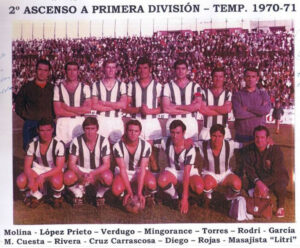 4 Córdoba (P) 38 17 11 10 50 30 +20 45[a]
4 Córdoba (P) 38 17 11 10 50 30 +20 45[a]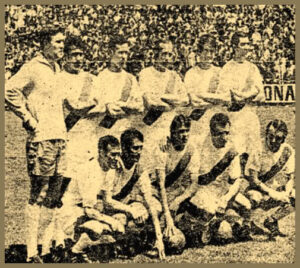 5 Rayo Vallecano 38 18 9 11 51 29 +22 45[a]
5 Rayo Vallecano 38 18 9 11 51 29 +22 45[a]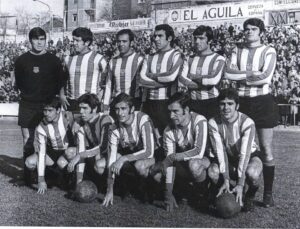 Standing from left: Galán, Domenech, Mur, Sabaté, Riera, Figuerola,
Standing from left: Galán, Domenech, Mur, Sabaté, Riera, Figuerola,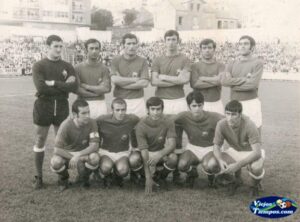 8 Ferrol 38 16 8 14 39 43 −4 40[b]
8 Ferrol 38 16 8 14 39 43 −4 40[b]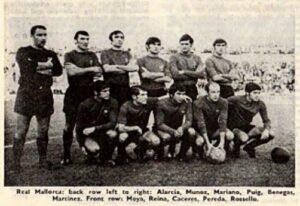 9 Mallorca 38 12 16 10 43 35 +8 40[b]
9 Mallorca 38 12 16 10 43 35 +8 40[b]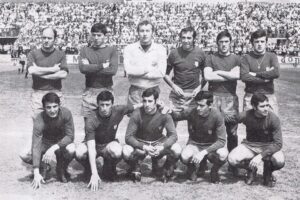 Standing from left: Irulegui,Albino,Illumbe,López,Amavisca,Clemente,
Standing from left: Irulegui,Albino,Illumbe,López,Amavisca,Clemente, 11 Hércules 38 13 11 14 39 48 −9 37[c]
11 Hércules 38 13 11 14 39 48 −9 37[c]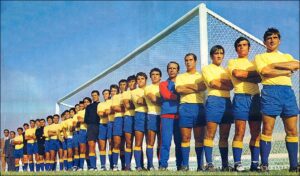 12 Cádiz 38 11 15 12 32 40 −8 37[c]
12 Cádiz 38 11 15 12 32 40 −8 37[c]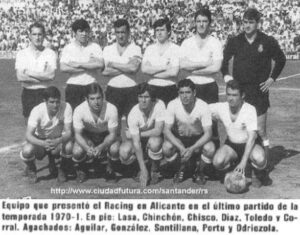 13 Real Santander 38 15 6 17 48 50 −2 36
13 Real Santander 38 15 6 17 48 50 −2 36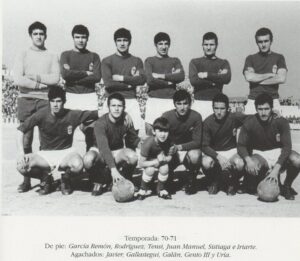 14 Oviedo (O) 38 12 10 16 41 37 +4 34 Qualification for the relegation playoffs
14 Oviedo (O) 38 12 10 16 41 37 +4 34 Qualification for the relegation playoffs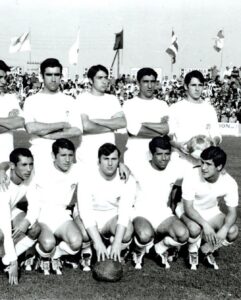 18 Onteniente (R) 38 8 15 15 30 47 −17 31 Relegation to Tercera División
18 Onteniente (R) 38 8 15 15 30 47 −17 31 Relegation to Tercera División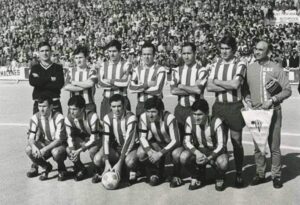 20 Moscardó (R) 38 6 11 21 22 51 −29 23
20 Moscardó (R) 38 6 11 21 22 51 −29 23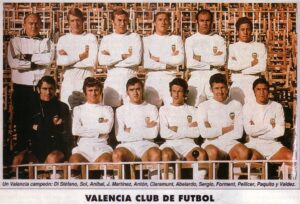 Pd W D L GF GA Pts
Pd W D L GF GA Pts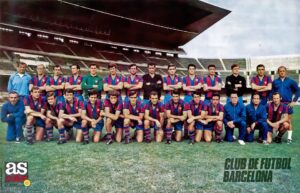 2.FC Barcelona 30 19 5 6 50-22 43
2.FC Barcelona 30 19 5 6 50-22 43 3.Atlético de Madrid 30 17 8 5 51-20 42
3.Atlético de Madrid 30 17 8 5 51-20 42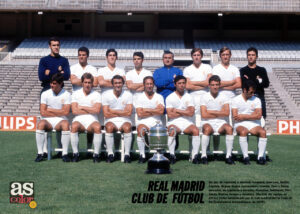 4.Real Madrid 30 17 7 6 46-24 41
4.Real Madrid 30 17 7 6 46-24 41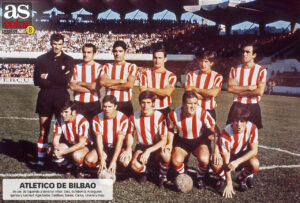 5.Athletic de Bilbao 30 14 7 9 40-31 35
5.Athletic de Bilbao 30 14 7 9 40-31 35 6.RC Celta 30 15 5 10 37-32 35
6.RC Celta 30 15 5 10 37-32 35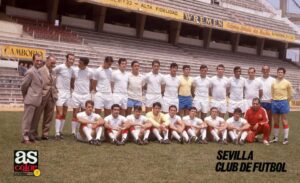 7.Sevilla FC 30 13 6 11 34-42 32
7.Sevilla FC 30 13 6 11 34-42 32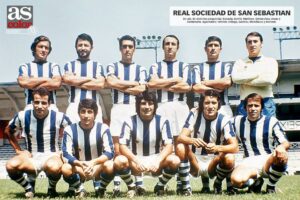 8.Real Sociedad 30 10 9 11 23-27 29
8.Real Sociedad 30 10 9 11 23-27 29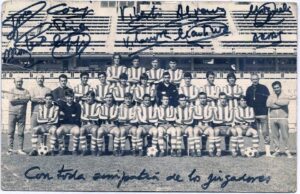 Top row from left: Viberti, Martínez, Álvarez, Monreal. Middle row: Espejo, Beigveder, Cabral, Irles, Pons, Deusto, Roldán, Arias, Vilanova, Kalmar (entrenador). Sitting: Montero, Goicoechea, Mori, Migueli, Varela, Conejo, Benítez, Bua, Chuzo, Macias, Aragón.
Top row from left: Viberti, Martínez, Álvarez, Monreal. Middle row: Espejo, Beigveder, Cabral, Irles, Pons, Deusto, Roldán, Arias, Vilanova, Kalmar (entrenador). Sitting: Montero, Goicoechea, Mori, Migueli, Varela, Conejo, Benítez, Bua, Chuzo, Macias, Aragón.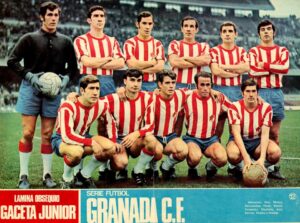 10.Granada CF 30 10 8 12 33-34 28
10.Granada CF 30 10 8 12 33-34 28
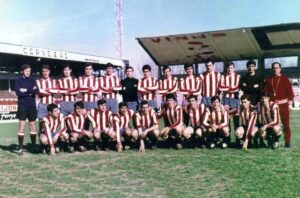 12.Sporting de Gijón 30 10 5 15 35-44 25
12.Sporting de Gijón 30 10 5 15 35-44 25 13.CD Sabadell 30 8 5 17 28-49 21
13.CD Sabadell 30 8 5 17 28-49 21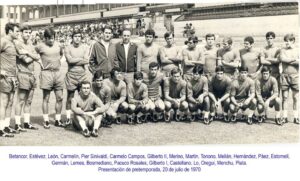 14.UD Las Palmas 30 5 10 15 33-42 20
14.UD Las Palmas 30 5 10 15 33-42 20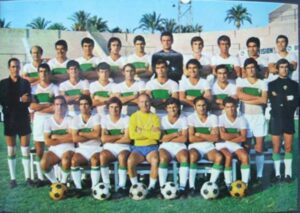 15.Elche CF 30 4 10 16 25-46 18
15.Elche CF 30 4 10 16 25-46 18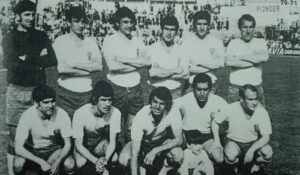
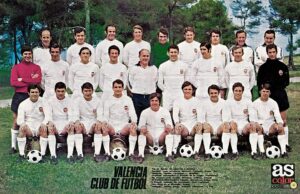 Valenica won their 4th title, coached by Alfredo di Stefano. It was a long wait – since 1947 – but finally a triumph. If goal-difference counted, Valencia would have been second… so, lucky to a point, having better record (a win and a tie) against Barcelona.
Valenica won their 4th title, coached by Alfredo di Stefano. It was a long wait – since 1947 – but finally a triumph. If goal-difference counted, Valencia would have been second… so, lucky to a point, having better record (a win and a tie) against Barcelona.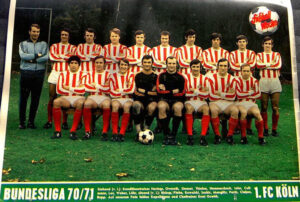 1.FC Koln failed to win the trophy second year in a row. Twice unlucky, this time lost in extra time.
1.FC Koln failed to win the trophy second year in a row. Twice unlucky, this time lost in extra time.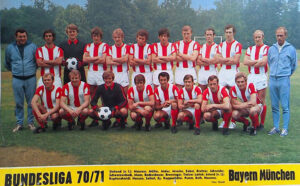
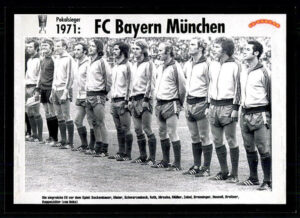 Bayern won their 5th Cup.
Bayern won their 5th Cup.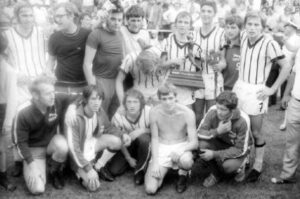
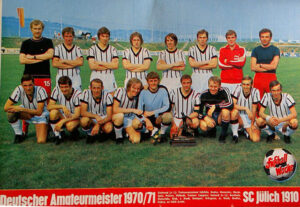 SC Julich 1910 won their third consecutive amateur title in front of 6000 fans. The gates declined significantly – in 1968-69 the final was attended by 12 000.
SC Julich 1910 won their third consecutive amateur title in front of 6000 fans. The gates declined significantly – in 1968-69 the final was attended by 12 000.